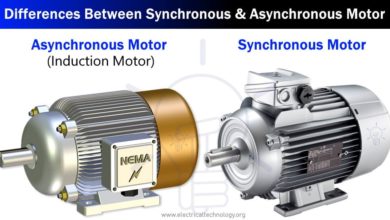Questions – Answers
Electrical and Electronics Engineering Interview Questions and Answers
-

Difference between Electric Field and Magnetic Field
What is the Difference between Electric Field & Magnetic Field? The electric field and magnetic field are both fundamentals of electrical and electronics engineering. The electric field is the area…
Read More » -

Difference between Electron Current and Conventional Current
What is the Difference between Conventional Current and Electron Current? The electrical & electronics engineering is the study that revolves around the electric current. Electric current can be classified into…
Read More » -
kVA to Amps Calculator – How to Convert kVA to Amps?
How to Convert kVA to Amps? Calculator and Examples kVA to Amps Calculator The following kVA to Amps conversion calculator will convert the apparent power “S” (i.e. kilovolt amperes or…
Read More » -
Amps to kVA Calculator – How to Convert Amps to kVA?
How to Convert Amps to kVA – Calculator and Examples Amps to kVA Calculator The following Amps to KVA conversion calculator will convert the current “I” in amperes “A” to…
Read More » -
What is Electrical Energy? Its Unit, Formula & Applications
Electrical Energy, Its Unit, Formula and Applications What is Energy? Energy is the capacity for doing work or the ability to do some work is known as energy. Energy exists…
Read More » -
Why Does the Heating Element Glow but Not the Cord of Heater?
Why Does the Heating Element Glow While the Cord of the Heater Doesn’t? It is a matter of common experience when the element of the heater connects to the electric…
Read More » -
What is Joule’s Law and Heating Effect of Current
Joule’s Law – Joule Effect or Heating Effect of Current and its Applications An English physicist James Prescott Joule discovered the Joules’ law (also known as Joel’s effect, Joule-Lenz law…
Read More » -
Fleming’s Left Hand Rule and Fleming’s Right Hand Rule
Fleming’s Left and Right Hand Rules – What is the Difference? John Ambrose Fleming introduced these useful rules in the late 19th century which are applicable in magnetism and electromagnetism.…
Read More » -
Advantages of Three Phase System Over Single Phase System
Advantages of 3-Phase Power over Single Phase Power System A three phase power generation, transmission and distribution system is very common around the world due to solid advantages over single…
Read More » -
Difference between Synchronous and Asynchronous Motor
What is the Difference between Synchronous and Asynchronous Motor (Induction Motor) The electrical motors are machines that convert electrical energy into mechanical energy for performing mechanical operations. These motors can…
Read More »







